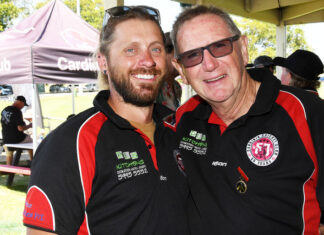KOOWEERUP’s Shane Dole and Pakenham’s Ben Maroney have played with and against each other for the best part of 20 years but never have the duo enjoyed joint success like they did in round 13 of West Gippsland cricket last week.
Dole, 34, set the competition alight on week one with a brilliant 178 not out against Pakenham Upper-Toomuc but was usurped just seven days later by Maroney, 34, next month, whose belligerent 196 against Upper Beaconsfield helped his beloved Lions secure a finals berth.
How do these blokes do it? So many cricketers around the globe get good starts where a faultless 20 or 30 might be converted into a stylish half century or a match-winning 80 or 90.
But what sets the elite cricketers apart? What drives them to these massive totals? What makes them tick?
Dole and Maroney let the Gazette in on a few of their secrets earlier this week and we started by asking the two how they approach the start of each innings.
“It’s just a matter of setting goals to suit the situation,” Dole said.
“Batting at number three I could be in at 1/10 or 1/110 so you need to read the game.
“From a personal point of view, one thing I do is count every run, I know exactly what I’m on at every stage of my innings and that really seems to help my concentration.”
Maroney’s approach varies slightly from that of Dole.
“I do like to know my score but I don’t count at the start of an innings,” Maroney said.
“It’s more about breaking down the team targets. On Saturday we needed roughly 100 runs to win so we broke it down into five lots of 20.
“As the innings rolls on I like to know what I’m on, at drinks breaks I’ll always find out exactly what my score is and when you’re reaching milestones your team mates give you signals.
“It just helps you concentrate.”
Knowing their games is a big part of building huge totals.
Dole said he knows his own strengths and scoring zones while Maroney can feel when he’s in the groove.
Mentally, the two have different triggers that fire them up on the field. Dole said it’s the challenge of big games and not wasting a good start that heightens his concentration while Maroney digs deepest when in a verbal battle.
“For me the danger period is between 20 and 40,” Dole said.
“The key for me is to not get too aggressive through that stage, if you get to 40 you really want to cash in.”
Maroney said: “When someone’s trapping off you really want to stick it up’ em, the more they say the more you don’t want to go out.
“It’s just another thing that helps you to concentrate.”
Dole said he knows he’s in for a good day and gets satisfaction out of seeing the opposition captain scratching his head while Maroney appreciates it when he or someone else scores a big 100.
“It’s bloody hard work.
“It took me a long time to get my first 100 and it’s a big achievement for anyone.
“It’s good when the crowd starts to gather and word gets around when someone’s playing a big innings,” he said
The big challenge for both players will be how they back up from their epic performances.
An example from another sport is how difficult it is for golfers to shoot two low rounds in a row but both Dole and Maroney are more excited by their current form rather than anxious.
Ironically, Pakenham host Kooweerup in this week’s final round of matches and then the two can’t help but meet in the first week of finals. It’s an appealing scenario for both players.
“For me it’s not hard to get up for this week, you know you’re in good touch playing a big game on a fast ground against good opposition,” Dole said.
“I think both teams might need 350 to get over the line.”
Maroney is going to use a bowling machine to bring him back down to earth this week.
“I’ll really crank the speed up this week, really test myself to fine tune things,” he said.
“As Mark Vivian (former Pakenham coach) used to say, ‘it’s not how many good shots you play but how many bad shots you don’t play that make you a good player’.”
The big ton and beyond- Ben Maroney and Shane Dole will stare each other down over the coming weeks when Pakenham and Kooweerup square-off in both round 14 and the first week of finals. 77393 72790 Pi
Digital Edition
Subscribe
Get an all ACCESS PASS to the News and your Digital Edition with an online subscription
Seagulls legends honoured
**One of the most awesome things you’ll see in local sport is the new mural on the wall of the TOORADIN Sports Club. The...








